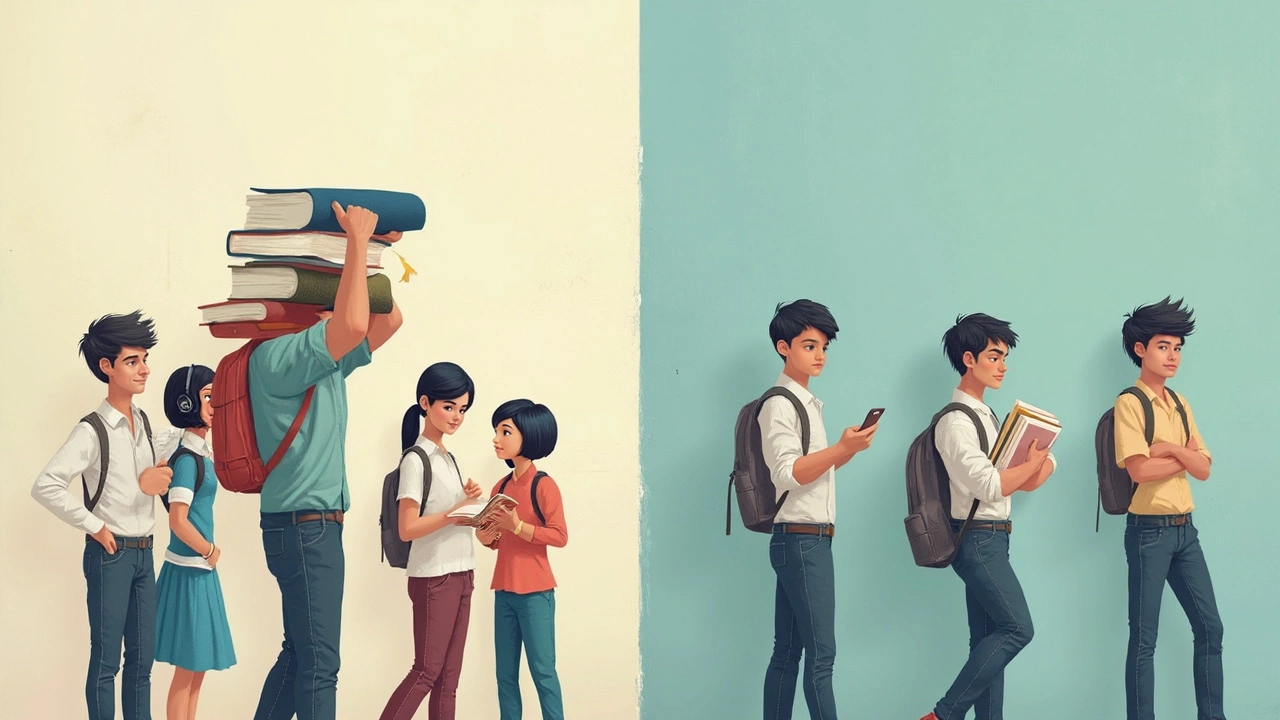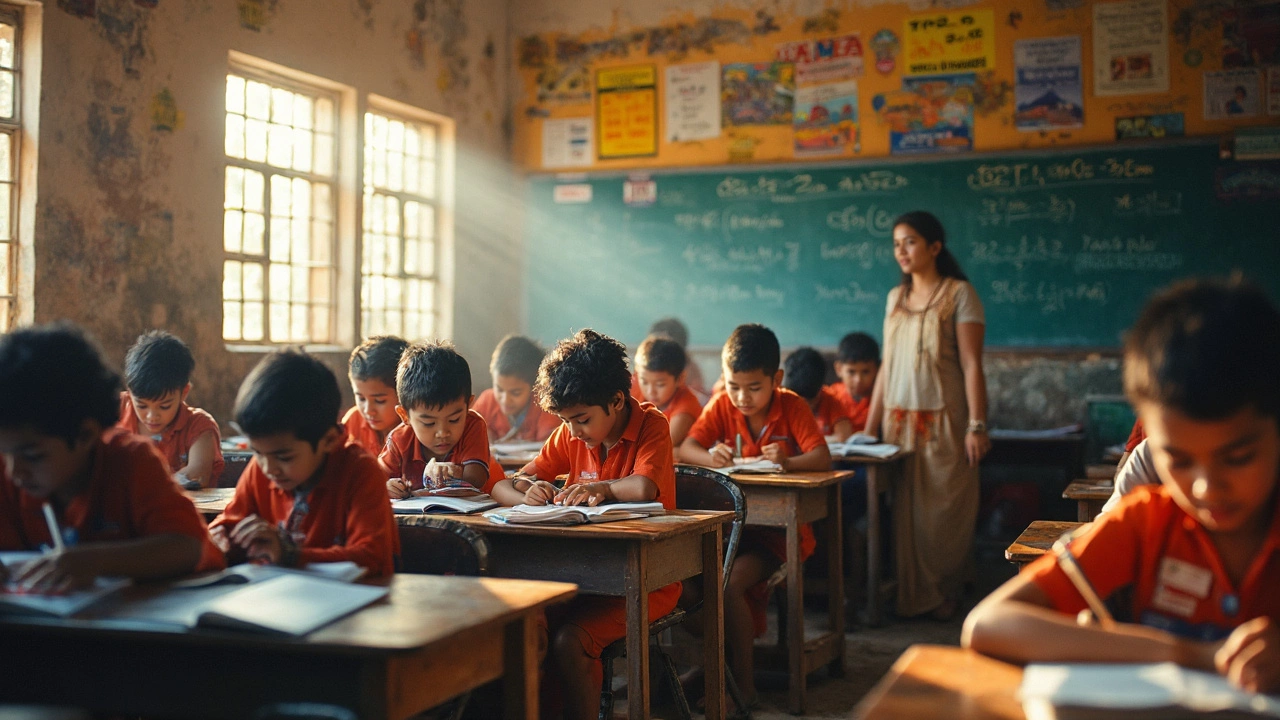Ask any student about the toughest school syllabus out there, and you'll get a different answer every time. Some kids sweat through the International Baccalaureate, others groan about the British A-levels, but in India, CBSE is the name that carries both respect and fear.
When folks debate 'Which syllabus is the hardest?' it’s not just about thick textbooks or endless notes. It goes deeper—like how many hours you’re hunched over a desk, the kind of questions on exams, and whether you have any time for, well, life. The CBSE syllabus is famous for drilling concepts, but there’s more to the story. Want to know where CBSE stands in the global race for the toughest curriculum? Let’s break it down and see what students are really up against.
- What Makes a Syllabus 'Hard'?
- How CBSE Syllabus Works
- CBSE vs. The World: Key Comparisons
- Student Life: The Real Challenges
- Tips for Surviving (and Thriving) Under CBSE
What Makes a Syllabus 'Hard'?
When we talk about a school syllabus being "hard," it’s not a random judgment. A tough syllabus usually has a mix of complicated concepts, a wide range of subjects, high expectations for exam answers, and little room for error. Some curriculums dive deep into subjects, while others spread out thin across many topics.
You can judge how tough a syllabus is by looking at a few key things:
- Content Depth and Breadth: Does it go deep into topics, or just skim the surface?
- Assessment Style: Are exams all about memory, or do they test whether you really get the topic?
- Speed: How fast do you have to cover new chapters?
- Practical vs. Theory: Is it just about writing, or do you have real-world labs and projects?
- Pressure: How much importance is put on scoring high versus overall understanding?
Let’s check out some famous syllabuses and see how they stack up on these points:
| Syllabus | Content Depth | Assessment Type | Global Reputation |
|---|---|---|---|
| CBSE (CBSE) | Strong in Science & Math | Concepts + Rote | Challenging in India |
| IB | Very deep, requires analysis | Essays, projects, exams | High worldwide |
| British A-levels | In-depth, focus on subjects chosen | Subjective exams | Respected globally |
| American AP | Advanced but subject-specific | MCQs, free response | Useful for college credit |
Some research looked at Indian students in CBSE and found that about 30% spend over 4 hours daily on homework and revision. That’s serious time—and it shows the kind of daily grind that makes students say it's hard. Plus, the pressure of board exams can be intense. But hard doesn’t always mean bad—sometimes it means you’re really being challenged to learn.
How CBSE Syllabus Works
The CBSE syllabus sets the rules for more than 24,000 schools in India and some in other countries too. It’s shaped by the National Council of Educational Research and Training (NCERT), and it sticks close to what’s called a "concept-based" system. What does that mean? Instead of just memorizing facts, students are supposed to actually understand the core ideas behind every subject.
Here’s how it’s rolled out:
- Subjects get split into theory (the classic lectures and written part) and practicals (labs for stuff like science and sometimes maths).
- The academic year runs from April to March, broken into two terms, topped off by heavy-duty board exams in 10th and 12th grade.
- In middle and high school, you usually tackle at least five subjects: English, a second language (like Hindi), science, math, and social science. In higher years, you pick streams—Science, Commerce, or Arts—and every stream piles on its own set of tough core subjects and electives.
CBSE gave a big push to Continuous and Comprehensive Evaluation (CCE) for a while—this meant regular tests all year, not just one final make-it-or-break-it exam. But, by 2017, most of that went out the window, and final exams took center stage again.
One cool thing: textbooks and patterns are updated every few years to make sure students aren’t stuck in the past. NCERT tries to keep things close to real life so you might actually see examples from your own surroundings pop up in your books.
| Aspect | CBSE Facts |
|---|---|
| Founded | 1962 |
| Number of Schools | 24,000+ (India & abroad) |
| Key Exams | 10th and 12th Board Exams |
| Evaluation | Marks-based (recent), previously CCE |
| Textbook Source | NCERT |
CBSE is also one of the main boards behind national entrance tests—think JEE (for engineers) and NEET (for doctors). That’s why parents and students treat its syllabus like gold dust. If you’re aiming for these entrance exams, sticking to CBSE can give you an edge because those papers follow the same blueprint.

CBSE vs. The World: Key Comparisons
When it comes to tough school syllabi, the big hitters besides CBSE are Finland's National Curriculum, the International Baccalaureate (IB), the Cambridge International A-Levels, and China’s Gaokao system. Each one is tough in its own way. But let’s look at how the CBSE syllabus stacks up against these giants on the things that matter: exam pattern, pressure, and student life.
- CBSE: Focuses heavily on theory and concept-based questions, especially in science and math. Exams are high-stakes, but there's a set pattern to follow. CBSE board exams in grade 10 and 12 decide your college direction. The syllabus is mostly centralized, and teachers don’t have much freedom to add or skip topics.
- IB (International Baccalaureate): Huge on projects, essays, and internal assessments. Students juggle six subjects, write research papers, and even do community work. There’s a lot more freedom, but also more depth. This one’s not just tough on memory, it stretches your thinking.
- Cambridge A-Levels: Subjects can go super deep. The exams give some room for interpretation and application, but you still need a solid memory for facts. School life here can get pretty intense.
- Chinese Gaokao: Wildly competitive, with a single exam basically deciding university admissions. Kids prep for years, often with 12-hour study days. The stress here is next level.
- Finland's National Curriculum: Known for being student-friendly. More freedom, way less rote learning, and not much pressure for exams at all. But that doesn’t mean it’s easy—students are expected to think for themselves and solve real-life problems.
Here's a quick heads-up on where each syllabus stands in terms of pressure and daily grind:
| System | Focus | Exam Stakes | Flexibility | Reported Student Pressure |
|---|---|---|---|---|
| CBSE | Concepts, memory | Board exams crucial | Low | High |
| IB | Analysis, projects | Assessments throughout | High | High |
| Cambridge A-Levels | In-depth, application | Finals very important | Medium | Medium-High |
| China Gaokao | Exam drills, memory | Single life-changing exam | Very Low | Extreme |
| Finland | Application, creativity | Ongoing assessments | Very High | Low |
So, is CBSE the hardest? It’s up there, thanks to the sheer volume and the high-stakes exams. But it’s different from IB or Gaokao, which add mental pressure in their own unique styles. What’s clear: every tough syllabus pushes kids, just not always in the same way.
Student Life: The Real Challenges
Students living through the CBSE syllabus don't just deal with books—they’re in a constant tug-of-war between memorizing concepts, managing time, and fighting off burnout. Ask someone who’s prepping for Boards, and they’ll tell you it’s more about stamina than smarts.
What sets CBSE apart? The rhythm of the year is packed with back-to-back assignments, regular unit tests, and huge pressure for scoring high marks, especially in classes 10 and 12. Parents, teachers, and even classmates talk about Board results all year, and it isn’t just talk—these scores impact everything from college admissions to career choices.
“CBSE’s focus on core concepts makes you think, but the pressure from constant testing can leave students exhausted by the end of the year.” — Tara Bhandari, school counselor at Delhi Public School
Unlike some other tough programs, CBSE is heavy on examinations and theory, with less focus on practicals or creative projects. This means students often spend hours cramming details and working through sample papers. Extra classes and private tuitions are pretty much the norm in most cities.
- Most CBSE students have six to eight hours of classes daily, plus homework and coaching hours in the evening.
- It’s common for students to use up most weekends for exam prep, especially during board years.
- For class 12, over 70% of students take extra coaching beyond school to tackle competitive exams (like JEE or NEET) alongside CBSE Boards.
| Challenge | Frequency/Impact |
|---|---|
| Homework load (daily) | 1-3 hours |
| Mock/Test papers before Boards | 10+ per subject |
| Extra classes/tuitions in urban areas | Above 60% students |
| Reported student anxiety during Boards | High (Survey: CBSE 2023) |
If you ask students what’s hardest, it’s rarely the syllabus itself—it’s juggling everything at the same time without losing motivation. The tension peaks during Boards, when some schools even extend study hours and cut out sports or extracurriculars entirely. The system pushes students to build grit, no doubt, but the pressure can sometimes get too real.

Tips for Surviving (and Thriving) Under CBSE
If you’re under the CBSE syllabus, you know the drill—it’s a grind. But there are practical steps you can take to handle the workload and still have some sanity (and maybe even a good time).
- CBSE loves NCERT books. Around 90% of exam questions come directly from them, so study those more than anything else. Don't waste time hoarding a mountain of guides.
- Make short notes as you study. They save you when revision time hits and can help you spot important repeats in past years’ question papers.
- Past papers aren’t optional—they’re essential. Solving ten years’ worth actually helps you crack the pattern. A 2023 survey showed that students who regularly practiced with past years' papers scored nearly 20% higher on board exams.
- Don’t mug up. CBSE is moving toward application-based questions. Understanding basics means you won’t freak when questions get twisted.
- Stick to a routine. Even 30 to 45 minutes per subject every day beats marathon cramming. When you break tasks up, you remember more—and stress less.
- Use your school’s official sample papers (released on cbse.gov.in). The latest samples often hint at question formats, and sometimes identical types or even topics pop up in final exams.
- Group study can actually work if you pick the right company. Explain concepts to a friend; teaching makes ideas stick better than solo reading.
- CBSE ‘internal’ assessments (projects, lab work, and assignments) count for up to 20%-30% of your marks in some subjects. Don’t ignore them, even if finals seem more important.
Here’s some handy data to keep in mind:
| Strategy | Impact on Marks (Observed in 2023) |
|---|---|
| NCERT-focused Study | +15% score improvement |
| Practicing Past Papers | +20% score improvement |
| Regular Revision Notes | +12% better recall |
| Consistent Routine | More balanced prep, less burnout |
And a quick tip—if you’re ever stuck, CBSE’s official YouTube channel and DigiLocker have a goldmine of free resources, sample videos, and digital mark sheets. Use what's available—the system is tough, but it rewards smart strategy over raw slogging.
